The internet's cyber radicals: heroes of the web changing the world
A generation of political activists have been transformed by new tools developed on the internet. Here, a leading net commentator profiles seven young radicals from around the world
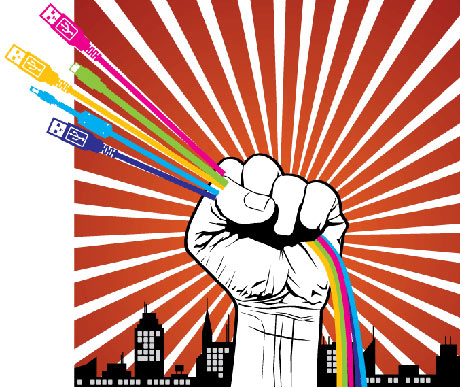
This simple decision, taken by a computer scientist used to working in environments that promoted openness and transparency, eclipses any hype about subsequent Twitter revolutions, Facebook campaigns or political protests ascribed to the platform since. The invention of the web is comparable to Gutenberg's invention of the printing press in 1450.
Like the printing press, the web has already been credited with ushering in an age of enlightenment; it is hailed, too, as the most powerful harbinger of social change the world has ever seen. But this isn't the first time such claims have been made. Tom Standage, author of The Victorian Internet, has argued that the telegraph, in the 19th century, inspired rampant technophilia. "The telegraph was the first technology to be seized upon as a panacea," he has written. "It was soon being hailed as a means to solve the world's problems.
"It failed to do so, of course – but we have been pinning the same hope on other new technologies ever since."So is the web over-hyped? In the 90s, when it still was in its swaddling clothes, revolution meant building a website brandishing the word "REVOLUTION!" in flashing red Comic Sans capital letters on a bright yellow background. Unfortunately, e-radicalism required a degree of technological capability. And political protests online were derivative, often no more effective than a giant billboard that people might drive by on the way to work or the shops. But everything did change in 2003 with the advent of a new crop of publishing platforms, blogs and social networks, that net pundits described as an entirely new phenomenon.
Stripping the hype away, this version of the web gives a new crop of cyber-revolutionaries access to a printing press, a radio station, a cable TV channel and more. Rather than virtual pamphleteering, they are developing technologies that take seed in grassroots communities. The power, as 20-year-old blogger and political activist Jody McIntyre puts it, is with the people.
In particular, there has been an explosion of technologies to circumvent censorship in countries where panic-stricken regimes have tried to stem dissident information. For example, Walid al-Saqaf developed an encryption technology called alkasir when the Yemeni government closed down his news aggregation site, YemenPortal.net. As the son of a campaigning journalist who died in mysterious circumstances, al-Saqaf felt that it was important that he use both his journalism and IT skills to get around the blockade, "because I felt it would have been a betrayal to my own profession to simply manipulate what people see".
"Information freedom is essential if you're really going to live a dignified life," he argues.The Chinese government is the most infamous of web censors, but there is evidence that even its Great Firewall is collapsing at its foundations. The country's most popular blogger is Han Han, a 28-year-old author (and professional rally car driver) who posts treatises openly critical of the government, but because he speaks in the youth vernacular and enjoys such a tremendous following, his personal politics are generally overlooked by the powers that be.
As Han told me: "Although the internet is controlled, when compared with traditional media, it better reflects reality."Other political activists I spoke with are using the web's hyper-connectivity and plug-and-play capabilities to crowdsource action. Kenyan-born Ory Okolloh helped create the website Ushahidi in the aftermath of her country's disputed presidential election in 2007; it collected eyewitness reports of violence sent in by email and text-message and placed them on a Google map, and the open-source software has since been released freely and used elsewhere for similar projects. Tom Steinberg is the founder and director of mySociety, a company that builds digital tools to provide a direct pipeline between individuals, local communities and local government.
Despite traditional media's fears that they are fast becoming obsolete, there is great respect among the modern cyber-radicals for the scale of attention that newspapers and TV can bring. "If I was running an election campaign and I had £10,000, I would still spend it all on TV ads, leaflets and posters," Steinberg says. "The internet is good at all sorts of things, but shoving your message down the throats of people who don't care — which is what it takes to win a campaign – it's not particularly great at." But on the web, he says, "you can make things that say, 'Go on, just have a go.'"In some instances, the political impulse is almost an afterthought. Christopher Poole is the American creator of 4chan, an image-centric bulletin board that he set up to discuss Japanese anime – but now its users, or some of them at least, are making use of the anonymity that the site affords them to campaigning ends.
By contrast, Peter Sunde is the co-founder of the Pirate Bay, a site that allows for the peer-to-peer sharing of computer files of any kind, but one that was set up with an explicitly political purpose. Sunde now has a jail sentence hanging over him.
What today's crop of cyber-radicals demonstrate is that power does reside in the hands of the people, thanks to the foundations laid by Tim Berners-Lee 20 years ago. And a new generation of social activists are exploiting the technological tools available to them for their own agendas.CHRISTOPHER "MOOT" POOLE – 4CHAN
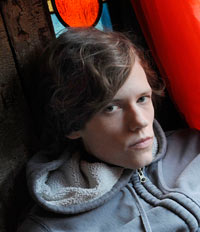 Christopher Poole, aka Moot, creator of 4chan.org. Photograph: Helayne Seidman
Christopher Poole, aka Moot, creator of 4chan.org. Photograph: Helayne Seidman Created the site 4chan in his New York City bedroom at the age of 15 in 2003, subsequently posting on the site using the pseudonym "moot". He intended the site to be a place to discuss Japanese comics and anime, but it soon morphed into something far bigger. The Wall Street Journal revealed moot's real-world identity in 2008.
What is 4chan?4chan is an image-centric bulletin board. It's based on a Japanese site called Futaba. Their code was publicly available so I downloaded a copy of their source code and translated the text from Japanese to English from an online resource. It's me, a handful of volunteer moderators and a part-time developer. For a site that has more than 10 million users and 700 million page impressions, most people are shocked to discover that it's not a company, it's not an operation, it's our hobby.
How has it evolved?
All of its growth has been organic. We've never advertised the site; it's been word-of-mouth. Now our traffic is about 12 million unique visitors per month. Part of the way it spread is because the images that are posted lend themselves naturally to be shared via IM [instant messaging], chat or email. People see a funny or provocative image, send it to their friends, and their friends come to 4chan. The community has a very distinct culture and language, and it's responsible for creating and propagating internet memes like lolcats [amusing pictures of cats] and Rickrolling [a prank involving the video for the 1987 Rick Astley song "Never Gonna Give You Up"]. As that started to trickle out into the mainstream… all of a sudden, it's not just something spread as word-of-mouth by 18- to 25-year-old video game nerds; it's hit mainstream consciousness.
The site is distinctive because users can post material anonymously, and some users have also organised themselves as a collective, using the name "Anonymous". What does that actually mean?All of its growth has been organic. We've never advertised the site; it's been word-of-mouth. Now our traffic is about 12 million unique visitors per month. Part of the way it spread is because the images that are posted lend themselves naturally to be shared via IM [instant messaging], chat or email. People see a funny or provocative image, send it to their friends, and their friends come to 4chan. The community has a very distinct culture and language, and it's responsible for creating and propagating internet memes like lolcats [amusing pictures of cats] and Rickrolling [a prank involving the video for the 1987 Rick Astley song "Never Gonna Give You Up"]. As that started to trickle out into the mainstream… all of a sudden, it's not just something spread as word-of-mouth by 18- to 25-year-old video game nerds; it's hit mainstream consciousness.
As recently as six years ago, people were used to forums where you could lurk, you could view, but in order to post and participate, you had to register. Because you didn't need to register on 4chan, people started to appreciate it, and realise how radically different it was. We began to see anonymity not just as an aspect or feature, but as a thing, as a principle, as an idea that we are one, we are a collective, we are Anonymous. People then came to the site who not only saw Anonymous as a principle, but started to exploit anonymity as a new platform where they could be rebellious and no one knew who they were.
"Anonymous" started a protest movement against the practices of the Church of Scientology two years ago. Were you complicit in their activities?
I didn't start 4chan as an outlet for dissenting voices and freedom of speech. At first the community was so tame. But as it became less tame, I felt there was something there worth protecting. The rise of social networking is an assault on the free, the open, the anonymous web. I started to appreciate that 4chan is one of the last bastions of freedom online. Anonymity – including anonymous posting – is something to be protected. 4chan is very privileged to be one of the last places for this type of discourse, for this type of interaction. That's important. That's why I've decided to be hands-off and to protect it as a place, and to deliver a platform.
Why?
Anonymity allows you to express and view opinions, images you wouldn't necessarily be comfortable with elsewhere. That doesn't necessarily mean you have to be negative. It's not about, "You can't say fuck on Facebook but you can on 4chan." Services where you have a persistent, registered identity such as Twitter and Facebook – in many cases it's your real identity – limit what users want to say and read. But you can on 4chan. It is an outlet. I was invited to speak at Facebook to provide an alternative and opposite perspective to theirs. Mark Zuckerberg's point of view is that anonymity and monikers and pseudo-identity represents cowardice. He said that if you have nothing to hide, what's the big deal? Why would you be concerned about putting all this stuff on your profile? Well, I'm not a zealot and people like what Facebook is doing. But there is a place for both. They both offer powerful utilities for different needs. The world still needs a Google, and Facebook. But it also needs the anonymous, ephemeral, open 4chan.
Are there any rules?
There is a set of codified rules and we do enforce them: don't break the law or post anything illegal. Past that, the users are left to their own devices.
ORY OKOLLOH - USHAHIDI
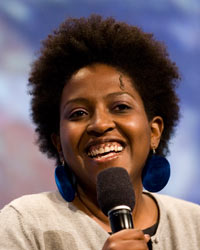 Ory Okolloh, founder of Ushahidi. Photograph: Brian Harkin/Getty Images
Ory Okolloh, founder of Ushahidi. Photograph: Brian Harkin/Getty Images Kenyan activist, lawyer and blogger, and co-founder of Ushahidi, a crowdsourcing technology. She is 33 and now lives in Johannesburg, South Africa.
What is Ushahidi?It is a non-profit technology company that specialises in developing free and open-source software for crowdsourcing and interactive mapping. We build tools for democratising information and increasing transparency – we're lowering the barriers for individuals to share their stories. It started out as an ad hoc group of technologists and bloggers hammering out software in a couple of days, trying to figure out a way to gather more and better information about the post-election violence in Kenya in January 2008. Since then, the platform has gone open-source, and it's free so it's now being used by organisations big and small all over the world.
How did digital technologies best meet your needs, rather than the traditional avenues of publication and dissemination?
Digital technologies offer the ability to get up and running in a low-cost way, and the possibility of reaching a much wider audience.
What is it about the web that makes it such an effective platform?
Its accessibility and the low barriers to publication of information – plus the ability to be who you are.
What can't the web do to change our attitudes and behaviour?
The web can't change our behaviour – it can influence us, but it's individuals who change.
Where will the web have its greatest effect over the next 10 years?
No question: Africa.
JODY McINTYRE – LIFE ON WHEELS
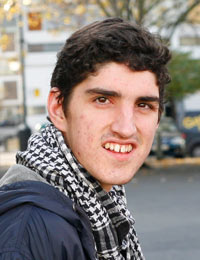 Jody Mcintyre, activist and Life on Wheels blogger. Photograph: Sophia Evans for the Observer
Jody Mcintyre, activist and Life on Wheels blogger. Photograph: Sophia Evans for the Observer A 20-year old British blogger and author of the site Life on Wheels, Jody was born disabled and campaigns worldwide for justice in Palestine.
Where does Life on Wheels come from?The site was born out of anger and frustration – as with the birth of every revolutionary movement. Essentially, I was going to college every morning and bus drivers wouldn't let me on the bus because I was in a wheelchair. So in response to these feelings, I began writing the blog, detailing my experiences.
Why use the web?
If you're not given a platform by others, you'll make your own. If your form of resistance is writing, then you will find any means necessary to get that writing out into the public consciousness, even if you have to write it on a piece of paper and pin it up on walls around London – [but] the way I saw it, everyone I knew was going on the internet.
What is it about digital tools that make them effective in galvanising people?
I don't think the internet is some kind of grand solution that will solve all our problems, but it helps because of its capacity to reach people across the world. A lot of revolutionaries talk about the necessity of encouraging revolution and resistance in any context around the world. If we're writing on the internet, the hope that someone in Kashmir or Palestine or Iraq can read what you're writing is a good one. With the web, people in power can't edit or co-opt what we've said. I can publish whatever I want to say. They can't censor our voices any longer. You can say whatever you like about Julian Assange and Wikileaks, but you can't change the video or the images that a million people saw in one day of American soldiers eager to kill Iraqi civilians. People see those images and know the truth is in front of their eyes.
What are its shortcomings?
We need to realise that most people in the world don't have access to the net. The internet is just the first step. The movement we want to build, the revolutionary movement for equality for all people, can only happen through direct action, and direct action on the streets. The internet can play a role in our political education, raising our political consciousness, but as long as people remember that this is a way to plan action, to organise ourselves, to connect people, but not the solution, then we'll be OK.
HAN HAN – BLOGGER
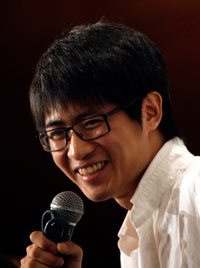 Han Han a professional rally driver, bestselling author, singer, creator of a literary magazine and China's most popular blogger. Photograph: Ym Yik/epa/Corbis
Han Han a professional rally driver, bestselling author, singer, creator of a literary magazine and China's most popular blogger. Photograph: Ym Yik/epa/Corbis The 28-year-old Chinese professional rally driver, bestselling author, singer, creator of a literary magazine and China's most popular blogger – indeed, possibly the most popular blogger in the world.
What are your greatest criticisms of the Chinese government and the current political climate there?The Chinese Communist party puts keeping their political position first above everything. Of course, this is the wish of many political parties around the world. For the Chinese government, the reality is that regardless of whether the people are satisfied or unsatisfied, the party's position will always be secure. However, they are sometimes nervous, sometimes arrogant and this attitude has caused many tragedies.
What impact do you hope your web activity will have on the political system?
Although China has many idealistic journalists and media figures, the media are still controlled and censored. Although the internet is controlled, when compared with traditional media it better reflects reality. Rather extreme views or false information may sometimes appear on the internet, but it's only because traditional media fail to take the responsibilities they should take. The government might think the internet is really annoying, but I think it actually helps the government.
How do you think internet-based social change is different in China?
The only difference is English-speaking countries treat the internet as technology, while Chinese-speaking countries treat the internet as medicine.
How did you decide the internet was the best mouthpiece for your views? You already had a profile in traditional media, so why not use them?
It's faster and more direct. It's almost impossible to publish sensitive articles in traditional media. Even though others might delete your writing online, at least you can publish your opinion completely. I don't write articles to oppose a specific party or government; my articles could criticise any party. I'm a writer. How can I call myself an intellectual if I can't write and publish words as I wish?
Why do you feel you can get away with statements against the government that other people wouldn't?
The atmosphere is not as terrifying as people in the west may think. Sometime my articles do get censored, but besides those who advocate policy changes and democratic reform, the government actually doesn't often control or censor writers. The writers here have become smarter: they know what to write and what not to write.
How have you dealt with resistance from your detractors, in particular the Chinese government?
They can only censor my articles, not my thoughts. I can accept this type of censorship. It's a game, and I'm playing by other people's rules. I don't think the government disagrees with the ideas in the articles that were censored; they are afraid of the ideas spreading.
What effect do you feel you are having on the political psyche of China's youth?
I can't really influence them in any way, but I hope that when the country is one day in their hands they will remember the past and take good care of this nation. In that world there is no capitalism, socialism, communism or feudalism; there is also no westernisation or easternisation. There is only right and wrong, beauty and ugliness, good and evil.
Where will the most radical change brought about by the web be felt in 10 years?
I'll answer this question in 2013, when we have confirmation that the world still exists. Otherwise my answer now will be rubbish.
PETER SUNDE – THE PIRATE BAY
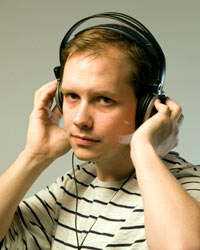 Peter Sunde, co-founder of The Pirate Bay. Photograph: Richard Saker for the Guardian
Peter Sunde, co-founder of The Pirate Bay. Photograph: Richard Saker for the Guardian The 32-year old Swedish co-founder of the Pirate Bay, the world's leading file-sharing site, allowing users to exchange music, games, videos and more. Found guilty, along with his colleagues, of assisting others in copyright infringement in 2009; lost his appeal last week (after this interview took place) and now faces eight months in jail and a fine shared with his colleagues of £4.1m.
What is the Pirate Bay?
The Pirate Bay was a project developed as part of an "anti-anti-piracy group" started in Sweden called Piratbyrån. Pirate Bay blew up because other file-sharing sites were being shut down because of legal pressure from Hollywood. Most of the other sites were run by 16-year-old guys, and when you're that age and you get a letter from a Hollywood attorney saying they're going to sue you for all the money in the world, you shut down your site. We wanted to make a statement and take on the fight. The internet is based on the idea that everyone can share whatever they want. If you start having gatekeepers you have a consumer-and-producer relationship. We didn't like the idea that corporations would take the internet and turn it into cable TV.
What philosophy lay behind your attitude?The Pirate Bay was a project developed as part of an "anti-anti-piracy group" started in Sweden called Piratbyrån. Pirate Bay blew up because other file-sharing sites were being shut down because of legal pressure from Hollywood. Most of the other sites were run by 16-year-old guys, and when you're that age and you get a letter from a Hollywood attorney saying they're going to sue you for all the money in the world, you shut down your site. We wanted to make a statement and take on the fight. The internet is based on the idea that everyone can share whatever they want. If you start having gatekeepers you have a consumer-and-producer relationship. We didn't like the idea that corporations would take the internet and turn it into cable TV.
We were influenced by Public Enemy and the KLF. And by traditional French philosophers, rather than by any US west coast libertarians.
What makes you think that the free sharing of files online can be right?
I grew up with computers. I got my first computer when I was nine, and everything I learned about computers was from copies. I wouldn't be able to program if it wasn't for illegally copying my first programming language compiler.
How did your attitude develop?
I started reading academic papers about file sharing that said it is good for the community; it's good for the artist. The only people who lose are the record companies and the studios. Copyright is based on the notion that there are certain companies who should be able to profit from culture. It's not based on the idea any more that people who create things should be able to benefit, or get money for it. Copyright is boring, so no one really wants to get to know it. It's such a big legal field, so the companies who can profit from it have a free arena to dictate terms. But the internet removed the middleman. I don't understand why that's a bad thing. I see the situation in the same way as discovering a car that runs on water and the oil companies forbidding water to be used in cars.
Why is the web important?
It means there are no gatekeepers any more. You have the power to influence people as quickly as you can connect with the internet. With Twitter and Facebook you don't even need to create your own publishing platform. You just have to have an idea. In Sweden, after the recent election, a 17-year-old immigrant girl created a Facebook group calling for a demonstration against the [rightwing, nationalist Sweden Democrats] who were voted into office. Ten hours later, 6,000 people showed up and started demonstrating.
WALID AL-SAQAF – YEMEN PORTAL
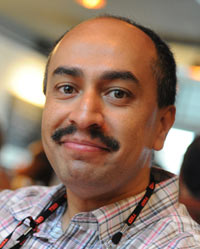 Walid al-Saqaf, creator of Yemen Portal. Photograph: James Duncan Davidson/TED
Walid al-Saqaf, creator of Yemen Portal. Photograph: James Duncan Davidson/TED The 37-year old Yemeni activist is the creator of Yemen Portal and of software used to circumvent firewalls.
What is Yemen Portal?YemenPortal.net is a news aggregator. More than 90% of the content is in Arabic. It gathers information or news articles released on official news websites and through dissident and independent sites, and puts them together to present a comprehensive view of what's happening in Yemen. This feature has allowed a lot of people to look into dissident content they didn't know about.
Why was this necessary?
The traditional media in Yemen are very restrictive, and the broadcast media are monopolised by the state: you wake up in the morning in Yemen and turn on the news on TV and you find that all the news is about the president's meetings and the government's meetings.
How did the government respond to the fact that an increasing readership was discovering dissident content through Yemen Portal?
They simply blocked access to it, to the whole site from within Yemen. So I had three choices: give way and let the government control what did and didn't appear on my site; shut it down altogether; or keep the controversial content and find ways to allow people to access the site. I chose the latter, because I felt it would have been a betrayal to my professsion to manipulate what people see. I developed a piece of software called alkasir. If you were browsing the net and wanted to open your Gmail, your Gmail would go through the regular internet service provider. But when you open a blocked website, it activates itself and changes into the encrypted proxy mode. That's better than anonymising everything because if you do that, you give the impression to the monitors at the ISP that there is a fishy connection.
TOM STEINBERG – MYSOCIETY
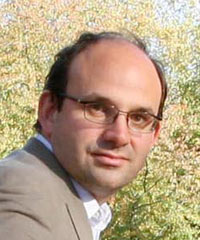 Tom Steinberg, founder of mySociety. Photograph: Anna Gordon for the Guardian
Tom Steinberg, founder of mySociety. Photograph: Anna Gordon for the Guardian The 33-year old founder of mySociety, which has developed websites in the UK including TheyWorkForYou and WriteToThem, aiming to bring greater transparency to government.
What is mySociety?MySociety builds websites that give people simple, tangible benefits in the civic and democratic parts of their lives. We run various democracy and transparency sites in the UK that do things like make it really easy to find out how your politicians voted or, on a more local level, help you report problems to the council, such as potholes and broken streetlights, or get information out of government that you might want via the Freedom of Information Act.
How can the web be used as a tool to influence people?
The internet enables you to help people to achieve things they might want to get done in their lives and in their communities on a scale that is not possible unless you are using such a cheaply scalable digital technology.
How has it transformed the political process?
There is no one thing that is "internet politics". There really are two worlds: partisan campaigning to exert power and to beat your opponents into a pulp; and the creation of what you might call empowering platforms using general-purpose tools that let people communicate, act, exert power or achieve goals like requesting information out of the government. These two really different things often get bundled together. There's actually quite a big difference between the way that Barack Obama used what was essentially an extremely good credit card form to raise $500m through his website, taking that money and using it to buy TV adverts and posters to beat the Republicans, versus services like those that we run. We build platforms so that people can achieve potentially smaller things that are not so single-minded in purpose.
What it is that you want to change by building these platforms?
We get people who've never tried to campaign on anything, they've never written to a politician, but if you make the barrier low enough and give them a reason, you'll push them over the edge.
Is the best way to influence the public to give them the tools or the messages?
If I was running an election campaign and I had £10,000, I would still spend it all on TV adverts, leaflets and posters. The internet isn't massively good at making people think things they don't currently think. It's very good at helping people to do things when they decide that they want to. I think that TV and adverts on the side of buses will be playing a dominant role in politics for a long time to come. But I'm a great believer that the internet will strengthen the community on your street because it can bring together people who care about an issue who didn't previously have a voice, so that they can then shout loudly enough to make political bodies and organisations pay attention.
Are you trying to transform local politics?
It would be lovely if measurably more people in the future felt they could realistically be part of the solution if there was some problem in their community, that it's not just something unimaginably over their heads that's dealt with by another class of people that they never meet. I am out to give as many people as I can a better experience of dealing with the democracy they live in and the government that rules over them.
